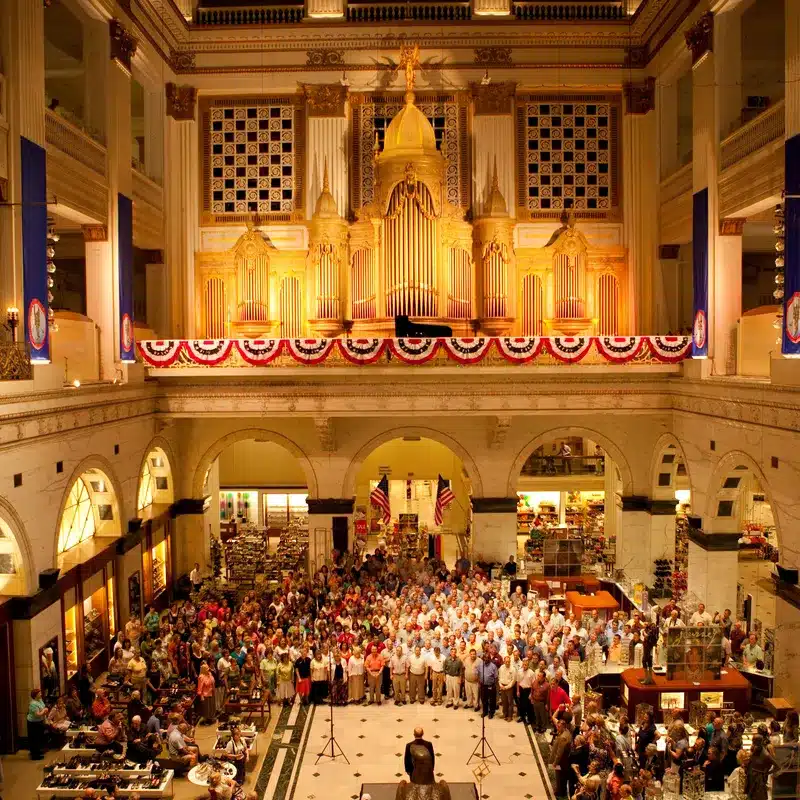Opera sells 101 percent of Ring tickets
mainHot on the heels of the Met’s wretched Wagner returns comes news from Amsterdam that their recent Ring cycle sold out – and more. Presumably some tickets were sold twice over or some of the skimpier Dutch agreed to share their seat to achieve a 101% records.
Statistics for Dutch National Opera 2013-14 season: 92% capacity attendance, 1o5,000 tickets sold, highest revenue. And this in a city of 750,000 population.
Are you reading, Peter Gelb?






Some comments on the sideline could not do harm… The reason that Dutch people like to go to the opera, i.e. the ONLY opera theatre as such in the country, is that most of them think it is some sort of musical but more chique. They don’t mind the regular, exasperatingly awful staging (Regietheater!), the abominable acoustics, the utter vulgarity of the building itself with the hall carried-out in bordello red and circus lights on the balconies, and the over-expensive drinks in the intervals. They feel it all as a real imitation of a real opera experience like in Paris, London, Berlin or Vienna.
Sometimes however, the staging strikes a better note, like Audi’s Ring, indeed. But that is an exception, also with Audi.
I stopped going to the opera on my own initiative years ago because of these reaons, but occasionally I let myself be dragged by friends to a performance, seduced by free tickets & pleasant company. Last week this happened with a really good production of Falstaff, in spite of the regular acoustic shortcomings, and thought it was a serious improvement of the usual Amsterdam production style, as if they had waken-up to some better understanding of how to run opera productions. Until I found-out that in fact it was a collaboration with the Met, the Scala and the ROH. So, the ‘Dutch’ part of it all was minimal. The orchestra (Concertgebouw Orchestra) probably played very well, it was difficult to hear in terms of audio. The singers had great difficulty synchronizing with the orchestra of which they probably did not hear much, the concluding fugue was a mess, etc. etc. etc. but they did their best.
If you’re so bothered by the accoustics, why not try to raise funds to build an opera house which deserves a “Borstlap approved” label?
Actually, that’s a nice idea… If I find a King of Bavaria, a couple of Patronatschein sponsors, a nice calm town somewhere in German woodlands, I build such a theatre. I would then suddenly come-up with the idea of a wooden inside structure, a sunken orchestra pit, and – and – … oh, you say, that exists already?
Thought you might want one in Amsterdam, but hey if you’re keen on doing it in the mountains, contact Martin Engstroem and the Verbier Festival… They dream of one in the mountains too.
Is Peter Gelb really to blame ? Don’t you remember “why” Gerard Mortier refused the job at the time ..?
Mortier refused the City Opera job NOT the MET.
I have been extremely lucky to have had the chance to attend the dress rehearsals of the Pierre Audi RING back in 1999. The memories of it will stay with me for life. There is a DVD as well as CD set available. Especially the “Götterdämmerung” DVD has won high praise from The Gramophone, recommending it as a set any Wagner lover will have to have in his or her collection. Good for Amsterdam’s Opera to sell out solidly. By the way, Norman, you may be right in that the skimpier Dutch share a seat as tickets sold at 101% – here is another Dutch skimpy thing: “een flesje cola met zes rietjes, asltublieft” – “a bottle of coke with six straws, please” 😉
Norman, it is in Holland not the city that counts, but the (small) country. More than 50% of all opera tickets are sold to people living outside of Amsterdam, yes who come from Maastricht or Groningen (over 100 miles from Amsterdam) to visit the opera…. Just to put our local records straight!
Pretty much everywhere people travel from far afield to go to events.
I.e.: In Switzerland a “city theatre” had to be renamed to “theatre”, because the surrounding communities stated that they finance and subsidize much of it, so it shall no longer be be referred to as the city’s theater.
I am not enthusiastic about the “Ring” produced by Gelb at the Met. But comparisons with Amsterdam in this instance are misleading. The Met accomodates nearly 4,000. The Dutch opera house accomodates only 1689.
If you compare ticket prices in New York and Amsterdam the reason for the latter’s success is obvious. The Met is three to four times the price of Amsterdam and has no state subsidy. Result – opera in Holland is accessible to a much broader section of society. Now that Arts Council England is following the US model of chasing private patronage to compensate for its recent savage cuts, just wait for the same thing to happen here.
Indeed. That’s why there should be state subsidies to keep cultural institutions afloat, garantee their existence, while sponsorship can be used for the extra expenses, special projects, etc.
Amsterdam is certainly a small city but much of the Netherlands is in fact a very urban agglomeration, the Randstad, with very good communications. I was sorry to read Mr Borstlap’s post, exceptionally snobbish if not arrogant.
Snobbery? My DENTIST is a real snob: wants to have the best equipment, use the last technology, insists upon the cleanest environment, ec. etc., while looking down upon prewar dentistry.
The size of Amsterdam’s opera house puts it, in my opinion, to distinct advantage compared to the MET. Especially in respect to the Audi-RING, during which the most important scenes are done right in the audience, by means of the circled stage which reaches considerably into the auditorium. A RING to be “consumed by”, rather than merely to “listen to and look at”. This writer attended the dress rehearsal of SIEGFRIED in 1999, and sat in one of the few chairs high up at the back of the stage, above the fire oven which Siegfried awakes to high tilt life when forging Nothung – I got a huge “swoosh” of heat and theater smoke right into my face! Unforgettable.
And not without danger: the presence of the orchestra on stage, and audience seats as part of the décor, blurred the boundaries between imagined and real reality. At one of the performances one audience member fell into the oven, while two others were dropped on stage because a cable problem reshuffled the wooden structure hanging in the air. These occurrances were highly praised in the press on the assumption that they were part of Audi’s stage direction. That is why these seats were called ‘adventure seats’, you could end-up as partaking in the production.
‘SIegfried’ was, by the way, a really very good production, I saw it in 2013.
Please Mr. Borstlap, stay away from the Dutch Opera. Most performances are sold out, so others will be happy to take your seat.
Yes, that’s why every performance in the Amsterdam opera theatre which I DON’T attend, is a rich source of altruistic contentment.
Always fun to read the artistic cut and thrust above, but no one has expalained the mysterious 101% of ticket sales.
I can think of three theories:
1) if the opera house only seats 1689, then 1% is 17 seats, so we are not talking about a lot. Could they have sold some tickets on a last minute standby basis (like the airlines do) if the patrons were not there just as the doors closed ?
2) are there seats reserved for corporate or other sponsors and therefore counted as pre-sold, which may be released for resale if the sponsor does not use them.
3) were extra seats laid out. I remember picking up last minute tickets at Concertgebouw and finding myself on a wooden chair at the back of the stage. A fantastic, if undignified, view. That would be a bit odd at a opera, but maybe there are other places where a dozen or so extra seats could be placed.
Just my speculation.
Are there any better informed explanations ?
The ‘extra’ percentages refer to the ‘adventure seats’ which formed part of the décor (and sometimes of the stage direction, see elsewhere), and the reinforcements of the strings of the orchestra which was seated on stage. Rumors have it that returned tickets have been sold twice and thrice without reimbursement, as well as that the singers had to buy tickets to be allowed entrance at the artist door. It appeared that staff suffered from trance-like states during preparing and execution of this Ring cycle…. three ushers had to be carried-away after Götterdämmerung. Wagner’s works often cause disturbances in the brain.